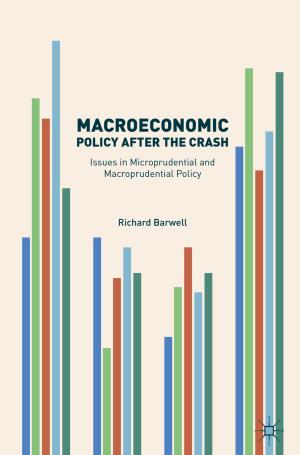Exploring the Mechanics of Chronic Inflation and Hyperinflation
Business & Finance, Economics, Public Finance, Macroeconomics| Author: | Fernando de Holanda Barbosa | ISBN: | 9783319445120 |
| Publisher: | Springer International Publishing | Publication: | October 17, 2016 |
| Imprint: | Springer | Language: | English |
| Author: | Fernando de Holanda Barbosa |
| ISBN: | 9783319445120 |
| Publisher: | Springer International Publishing |
| Publication: | October 17, 2016 |
| Imprint: | Springer |
| Language: | English |
This book presents a theoretical framework to explain chronic inflation and hyperinflation. The roots of these two phenomenon are a fiscal monetary regime in which money issues finance the public deficit. Chronic inflation is modeled by using both the old and the new Keynesian model, with a different policy rule. Instead of using the Taylor rule, the central bank policy rule states that money is issued to finance the public deficit. The chronic inflation models take into account the fact that indexation mechanisms adjust prices and wages, yielding the inertial component of inflation. The dynamics of these models can be very unstable under parameter changes or shocks that hit the economy. The previous hyperinflation models surveyed in this book attempt to explain hyperinflation as a bubble phenomenon because they assume a constant real deficit financed by money. The mechanics of hyperinflation models in this book explains hyperinflation by a fiscal crisis, characterized by an increasing fiscal deficit. This fiscal crisis yields an intertemporal budget constraint that is not sustainable. The analysis of the pathology of hyperinflation uses the same tools employed to understand the pathologies of public debt and external debt crises. The hyperinflation model allows a taxonomy of hyperinflations, namely bubble, weak and strong, that can be tested with the inflation tax revenue curve.
This book presents a theoretical framework to explain chronic inflation and hyperinflation. The roots of these two phenomenon are a fiscal monetary regime in which money issues finance the public deficit. Chronic inflation is modeled by using both the old and the new Keynesian model, with a different policy rule. Instead of using the Taylor rule, the central bank policy rule states that money is issued to finance the public deficit. The chronic inflation models take into account the fact that indexation mechanisms adjust prices and wages, yielding the inertial component of inflation. The dynamics of these models can be very unstable under parameter changes or shocks that hit the economy. The previous hyperinflation models surveyed in this book attempt to explain hyperinflation as a bubble phenomenon because they assume a constant real deficit financed by money. The mechanics of hyperinflation models in this book explains hyperinflation by a fiscal crisis, characterized by an increasing fiscal deficit. This fiscal crisis yields an intertemporal budget constraint that is not sustainable. The analysis of the pathology of hyperinflation uses the same tools employed to understand the pathologies of public debt and external debt crises. The hyperinflation model allows a taxonomy of hyperinflations, namely bubble, weak and strong, that can be tested with the inflation tax revenue curve.















